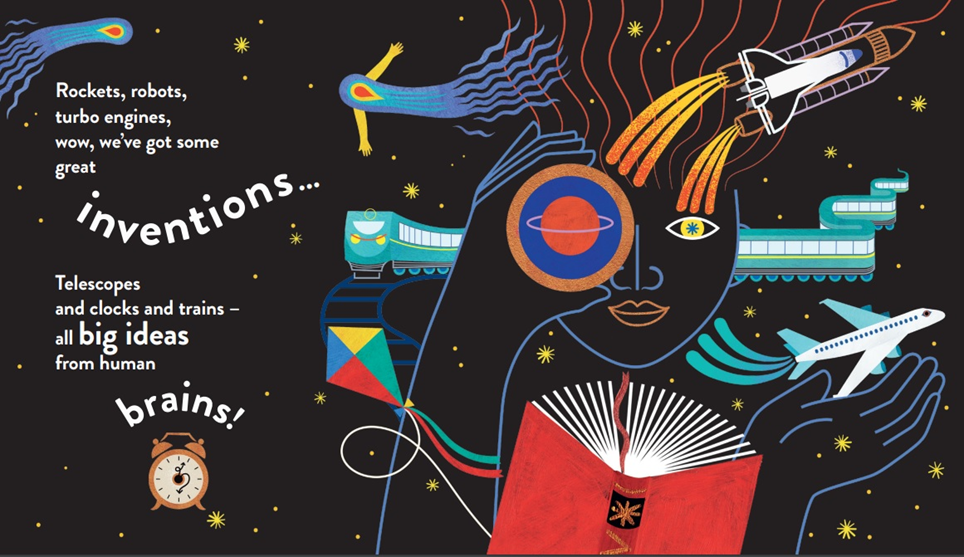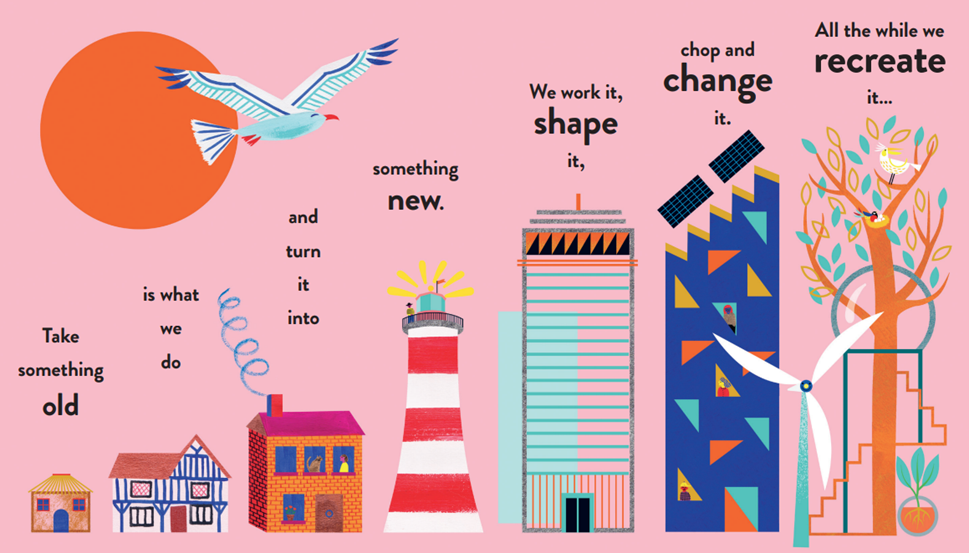James Carter


About Author
James Carter introduces Once Upon a Big Idea, the latest in his poetry books exploring ideas and science about our world.
James is an award-winning poet, non-fiction writer and ambassador for National Poetry Day. He travels all over the UK with his melodica (that's Steve) to give lively performances and workshops. In the last 20 years he has visited over 1400 schools, and performed at various prestigious literary festivals.
He lives with his family in Oxfordshire and offers global virtual poetry sessions.
Interview
Once Upon a Big Idea (Little Tiger Press)
March 2024
Exploring big ideas and concepts about our world and universe, James Carter's 'Once Upon A...' books bring together non-fiction and poetry in a playful mix of language, rhythm and ideas.
In his latest book, Once Upon a Big Idea, James takes us back to the start of humanity and gives young readers a journey through the history of ideas and inventions, and the materials that have helped shape them.

Q&A with James Carter
"I want to create books that you can pick up, read from start to finish, and go on a journey with."
1. Hello James, thank you for joining us on ReadingZone. Can you tell us how you started writing for children, and what inspired your 'Once Upon A...' books about our world and universe?
Well! When I began properly writing some 25+ years ago, I wanted to write poetry and non-fiction. I'd been writing music and songs and playing in bands for ages. But then I went to uni to train to be a teacher and do an MA in Children's Books and I got the book bug and tried writing fiction but that turned into poetry very quickly, as I discovered that I wanted to mainly write about real things but put a playful and creative spin on them, as you can with poetry.
I was very lucky as my poetry books came out quite quickly and I started visiting schools too - some 1500+ of them! I had the idea of merging poetry and non-fiction together years ago but didn't know how to start. Some eight or so years ago I finally wrote Once Upon a Star and sent it those brilliant bods at Little Tiger and they snapped it up, and asked me to do a series. Yes please! From there I wrote the whole series of mainly STEM-based poetry / non-fiction books.
2. Why did you feel that approaching these subjects through poetry rather than non fiction text would help children to explore and understand them?
They are still very much non-fiction but written in rhyming verse rather than prose. I'd read so many non-fiction books that had stunning illustrations but were just crammed with facts and were not readable in a linear narrative way. So, I thought I would try and do something different. Tell a story. In verse. Not have too much detail, as other books do that.
At times I wanted to add extra facts but not bog down the flow of the rhyming narrative, so I came up with the idea of an acrostic poem at the back - which could include a few extra details. One reviewer said the books lacked detail. GOOD! As they are not meant to have detail. They are meant to enthuse a young reader/listener who can then explore the subject further from there in more factual books. I want to create books that you can pick up, read from start to finish, and go on a journey with.
3. How many different subjects have you covered in these books, and were any of them particularly challenging?
The series has Once Upon a Star - the story of the sun (and the BIG BANG), Once Upon a Raindrop, the story of water (and water cycles etc), Once Upon a Rhythm the story of music, Once Upon An Atom - questions of science and Once Upon A Big Idea, the story of inventions.
There also two other sister books in the same format - The Beasts Beneath Our Feet, a prehistoric poem that focuses on a variety of extinct creatures, and The Big Beyond, the story of space travel.
ALL of them were challenging in a way as I know very little about anything. I have a very fizzy, busy brain that doesn't like too much detail - and I'm generally better suited to writing shortish poems. So with each topic I had to do SO MUCH research and find a story/arc/thread through each of the subjects - going to multiple books, documentaries, websites, museums, you name it. But what fun!
The hardest book was probably Once Upon An Atom questions of science - as science can be very complex at times, and I need to relay very tricky information as simply as I can - and crucially explain what Chemistry, Physics and Biology are so that 5-8 year olds can understand. That was HARD! And I didn't want sciencey bods emailing me saying 'you've got that wrong and that...' So I gave the manuscript to a couple of science specialists to check everything was sound. And luckily it was.

4. What is the latest book in the series, Once Upon a Big Idea, about, and what did you want to explore in the book?
What I was doing overall with this series is telling just some of the multiple stories of the earth. How our sun came about. How water came about. And music. And so on. I'd been considering a book about our key inventions over the millennia when Pat, the fabulous senior editor asked if I'd do a book about materials and boof! as soon as she said this, I saw a way in - write the story of how various natural and human-made materials led us to our key inventions.
5. How do you approach each invention you include, and how do you cover so many different inventions in Once Upon a Big Idea?
I made many lists of inventions as I went along - like hand tools / clothes / pots / bricks / the wheel - right up to musical instruments / computers / mobile phones etc. I Googled 'best inventions ever' many, many times and whittled it down to a reasonable number and worked from there.
All these books are trial and error. From research (with all of these books) I know roughly what I want to include, but a lot then changes as I write. And also, my brilliant editor Isabel would suggest re-writes of certain stanzas, tweaks here and there, even the ordering of the spreads/topics.
With Big Idea, there weren't too many changes. But I'm always happy to re-write as I want the book to be the very best it can be. Most of all, I'm EXTREMELY fussy about the rhythm and flow of the poetry itself. Getting that right - and perfectly right - takes as much time as the research.
6. Why did you decide to bring a focus to recycling in this book, as well as sharing new inventions through the ages?
The recycling idea came very early on when I realised that all our major creations are recreations. A pot is a recreation of clay. A boat is a recreation of wood. A brick is a recreation of stone. It was a wonderful EUREKA! moment when I discovered that. In fact, my favourite verse from the whole book is …
Take something old is what we do
and turn it into something new.
We work it, shape it, chop and change it.
All the while we recreate it.

7. Can you tell us about the rhythm of the writing in Once Upon a Big Idea, which feels quite different from your earlier books?
Well, thank you! (These are EXCELLENT questions by the way!) I'm delighted you said that as I wouldn't want the books to sound exactly the same. But having said that, I wrote them all independently of each other and didn't consciously think 'I'll give it a different rhythmic flow' from the others.
Perhaps it's the subject matter; there's more detail I guess, more 'stuff' to mention than with any other book in the series as on one level the book is an uber-list of all our key inventions / innovations - opening up with this stanza before it goes back to the start of human inventions / civilisation...
Rockets, robots,
turbo engines,
wow, we've got some
great inventions…
8. These books are inspirational as well as full of information, why did you want to take this approach to your subjects? What are you hoping to inspire in children in Once Upon a Big Idea?
Why, thank you again, kindly human! I think I'm just trying to tell this human story - as with all the other stories in the series - as scientifically / historically / factually accurately as I can and all the while make it as fun, funky and engaging and inspiring as possible, without going to over the top and turning it into a rap or something! I want the gentle rhythms, rhymes, and repetitions (and within the verses, some lyrical imagery when appropriate) to roll the reader from to cover and cover and for readers to go on and seek out more.
Each book ends with the emphasis on the child - and the child being proactive - whether it's a child becoming a musician, being made of stardust, being made of water, becoming an astronaut, digging for dinosaur bones or in this case, creating and inventing using recyclables!
9. Each of the books has a different illustrator; what do you feel the wonderful illustrations by Margaux Carpentier bring to this title?
I have always, always been unbelievably lucky with the illustrators I have had to work with. I am absolutely thrilled with each and every illustrator that Little Tiger have chosen. (And the fact they come from all over the globe. Hurrah! That is so important to me.) And the marvellous Margaux Carpentier from Paris is no exception. She was THE perfect choice, and she has brought so much to our book. Each spread has a different and mind-blowing vibe / aesthetic, and it works every time!
BUT each book was the creative product of four people at least - editor (Isabel and sometimes Pat), the designers (first Myrto, then Alice) and all the glorious illustrators. I cannot understate how much that editors and designers also bring to a book. Books would be nothing without them.
10. Are you working on a new 'big idea', will there be more books in the series? What else do you write, and what are you writing currently?
Ha! See what you did there, ReadingZone! Big Idea is probably the last in this series, but I so hope to work with Little Tiger in the future as they are so incredibly creative and responsive and committed to each and every book and I have learnt so much from doing this series with them.
Thank you for asking me to take part, you brilliant bookie-bods!
 Once Upon a Big Idea: The Story of Inventions
Once Upon a Big Idea: The Story of Inventions
 The Beasts Beneath Our Feet
The Beasts Beneath Our Feet
 Once Upon an Atom: Questions of science
Once Upon an Atom: Questions of science
 Once Upon a Raindrop: The Story of Water
Once Upon a Raindrop: The Story of Water
 The Big Beyond: The Story of Space Travel
The Big Beyond: The Story of Space Travel
 Zim Zam Zoom!: Zappy Poems to Read Out Loud
Zim Zam Zoom!: Zappy Poems to Read Out Loud
 Once Upon a Star: A Poetic Journey Through Space
Once Upon a Star: A Poetic Journey Through Space
